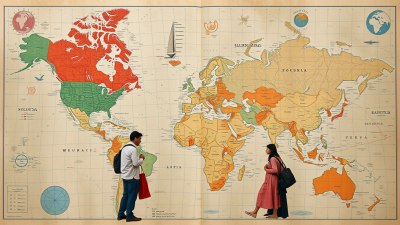Foreign Isn’t a Place, It’s a Feeling
Explore the emotional and psychological dimensions of feeling foreign in different cultures.

Image created with Flux Schnell
The term 'foreign' often evokes images of maps and borders, but it transcends physical locations; it resonates within our emotions and experiences. It’s common to feel foreign in a new environment, but that can also arise in familiar places due to cultural differences, language barriers, or even shifts in societal norms. This article explores the multifaceted notion of feeling foreign, from personal experiences to broader societal implications.
Understanding the Concept
The feeling of being foreign can manifest in various ways. It might stem from being in a new country where the language is unfamiliar, the customs are different, or even the people around you appear dissimilar. Yet, it’s not solely about geographical displacement. Many individuals experience this feeling within their own communities, especially as cultures evolve or new dynamics are introduced. As globalization accelerates, people frequently find themselves navigating unfamiliar territories, both physically and emotionally.
The Origins of Feeling Foreign
Feeling foreign often originates from exposure to diverse cultures, ideologies, and rhythms of life. People who’ve traveled to different countries may recount experiences of feeling out of place due to language barriers, varying social etiquettes, or contrasting lifestyles. Consider a person moving from a rural setting to a bustling metropolis; they may experience a sense of alienation despite living within their own country.
Foreignness in Personal Identity
Our sense of identity plays a significant role in shaping our feelings of foreignness. Factors such as race, ethnicity, and upbringing contribute heavily to how we interact with our surroundings. For example, someone who identifies with a minority ethnic group in a predominantly different culture may often feel disconnected or 'foreign' even in their home environment. Personal identity is not static; it shifts with context, experiences, and environments, which can evoke feelings of both belonging and alienation.
Emotional Responses to Feeling Foreign
Experiencing foreignness elicits numerous emotional responses. These can range from curiosity and excitement about new experiences to anxiety and discomfort from the unknown. Adapting to new environments may trigger feelings of homesickness or longing for familiar traditions. Conversely, it can also prompt appreciation for diversity and deepen one's understanding of global cultures.
Psychological Perspective
From a psychological standpoint, feeling foreign can significantly impact one’s mental health and well-being. The sensation is often linked to feelings of isolation and disconnection. It is essential to address these feelings constructively, as they can lead to anxiety or depression if left unexamined. Therapy and social support can play pivotal roles in mitigating these adverse effects, highlighting the importance of fostering social connections and community ties.
Navigating Foreign Spaces
To navigate foreign spaces, both literally and metaphorically, individuals can adopt several strategies. Firstly, developing cultural intelligence can enhance one’s ability to understand and adapt to new environments. This involves being open-minded, empathetic, and willing to learn from others. Secondly, engaging with local cultures through activities, interactions, and experiences can create a sense of belonging and reduce feelings of foreignness.
Building Bridges Across Cultures
Creating unity within diversity is crucial for all communities. Encouraging dialogue between different cultural groups fosters respect and understanding. Initiatives that involve cultural exchange, community projects, and educational programs can help bridge gaps between people from varying backgrounds. Promoting awareness of different cultures ultimately nurtures acceptance and reduces the stigma associated with feeling foreign.
The Role of Language
Language is a powerful tool that can either connect or divide us. For those who feel foreign due to language barriers, the stakes are high. Learning a new language can facilitate integration into different cultural settings. It enables individuals to communicate effectively and understand the nuances of a new environment. Moreover, engaging with language through local expressions, humor, and idioms can provide a profound sense of belonging and familiarity.
Storytelling as a Form of Connection
Storytelling remains one of the most profound ways to connect across cultural divides. Sharing individual stories of feeling foreign not only demonstrates vulnerability but also fosters empathy. When individuals recount their experiences, others can relate, creating shared understanding and connections among people from diverse backgrounds. This form of exchange enriches relational bonds and diminishes feelings of isolation.
Embracing the Feeling of Foreignness
Instead of viewing foreignness as a barrier, one can embrace it as a part of the broader human experience. It serves as a reminder of the vastness of our world and the richness that comes from diversity. Learning to appreciate different perspectives fosters personal growth and enhances our worldview, allowing for a more profound appreciation of life’s complexity.
Positive Outcomes of Feeling Foreign
Feeling foreign also has its positives. It encourages exploration, openness, adaptability, and resilience. Individuals who embrace their foreign experiences often emerge more culturally aware and better equipped to navigate complexities in increasingly multicultural societies. The awareness developed through these experiences can lead to a strong sense of self and an undeniable ability to empathize with others.
A Shared Human Experience
Ultimately, feeling foreign is a universal experience that transcends geographical boundaries. It signifies not just a physical location but also a psychological landscape shaped by feelings of belonging, acceptance, and identity. By recognizing and addressing the complexities that arise from foreignness, individuals can find common ground and foster connections that unite disparate cultures. Embracing our shared humanity allows us to forge genuine relationships, transforming feelings of foreignness into opportunities for growth, understanding, and collective progress.











